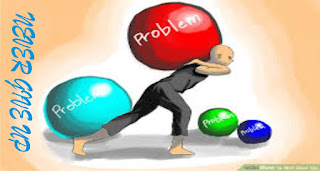Common mistakes about motivation
What is motivation?
Motivation is the reason for people's actions,
willingness and goals. Motivation is derived from the word motif in the English
language that is defined as a need that requires satisfaction. In other words,
at a given moment it is easier to change than to stay the same. It is easier to
take action and feel insecure in the gym than to sit still and experience
self-loathing on the couch. It is easier to feel uncomfortable while making the
sales visit than to feel disappointed about your dwindling bank account. This
is, I think, the essence of motivation. Each choice has a price, but when we
are motivated, it is easier to bear the inconvenience of action than the pain
of staying the same. Somehow we cross a mental threshold - usually after weeks
of procrastination and in the light of an approaching deadline - and it becomes
more painful not to do the work than to actually do it.
Common
mistakes about motivation
One
of the most surprising things about motivation is that it often comes after the
start of a new behavior, not before. We have this general misconception that
motivation arises from passively consuming a motivational video or reading an
inspiring book. However, active inspiration can be a much more powerful
motivator. Motivation is often the result of action, not the cause. Getting
started, even in very small ways, is a form of active inspiration that
naturally produces momentum. I like to refer to this effect as the Physics of
Productivity, because this is in fact Newton's First Law applied to habit
formation: objects in motion tend to stay in motion. Once a task has started,
it is easier to move on. You do not need much motivation once you have started
with behavior. Almost all friction in a task is at the beginning. After you
have started, progress will be more natural. In other words, it is often easier
to finish a task than to start it. One of the keys to getting motivated is to
make it easy to get started.
MOTIVATION ERRORS
1. The rush for
recognition. Poor planning is the starting point for many organizational
recognition issues.
2. Confusing priorities
and coordination.
3. Subjective
recognition.
4. Incorrect recognition.
5. Rewards that do not reward.
6. Inappropriate
recognition.
7. One size does not
fit all.
8. Loss of relevance and freshness.
SOME MOTIVATION ERRORS TO AVOID
The rush to recognition. Poor planning is the starting point for many organizational recognition issues. Some action-oriented companies tend to be ready for a targeted approach when planning. But where a systematic plan is highly desirable for individual and team recognition, it is absolutely essential for organizational recognition. Start with the end in mind of what you are generally trying to achieve.
Confusing priorities and coordination. Without realizing it, management often sends a staggering series of mixed messages that is recognized as confusion rather than
as a guide. When performance expectations are unclear, employees waste an
enormous amount of human energy trying to figure out what is really expected,
and different individuals and groups who are supposed to work together end up
working in different ways.
Subjective recognition. Too often recognition is given on the basis of subjective impressions, which are notoriously inaccurate. Subjective recognition is unequal, at most wrong and unfair, in the worst case. It is important to use carefully defined objective criteria that are in line with organizational objectives. Checklists can be useful to identify behaviors and outcomes that deserve recognition. Incorrect recognition.
Delay is the enemy of effective recognition. One of the challenges of
organizational recognition is how they can remain streamlined and
non-bureaucratic so that people can be recognized in time. If any kind of
recognition requires management approval, many - if not most - recognition
opportunities will be missed. Prevent recognition decisions with multiple
levels of approvals and always allow some forms of recognition that do not
require an approval level at all.
Rewards that do not reward. I have seen many examples in which the prizes
awarded in a recognition or encouragement program or competition caused more
problems than they had solved. Deciding what employees value the most without
consulting them is a sure way to increase the risk of missing the motivation
mark.
Inappropriate recognition. Sometimes recognition is too small or too large. Telling
someone in the hallway that they did a "nice job" when completing a
two-year project can be just as inappropriate as giving a staff member of the
month a cruise. One size does not fit all.
Another basic mistake
that people make is to create a false sense of honesty - exactly the same
recognition or reward for every employee. Few things are as unfair as the equal
treatment of inequalities.





Comments
Post a Comment